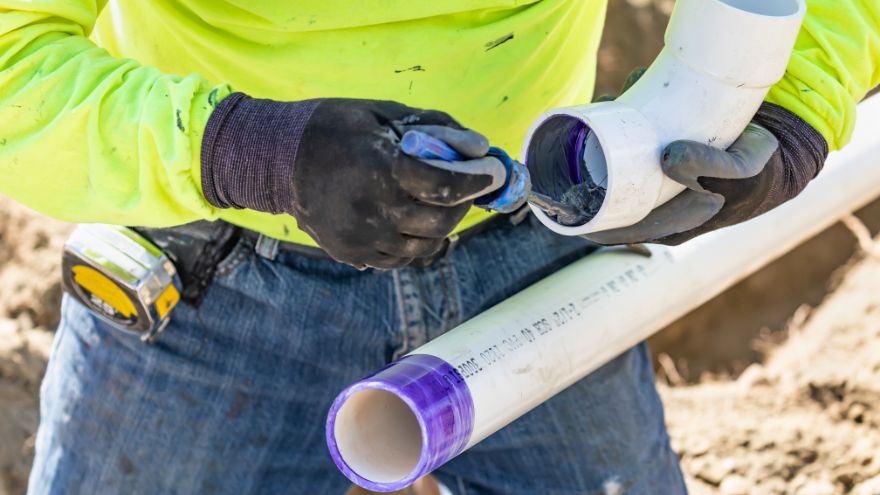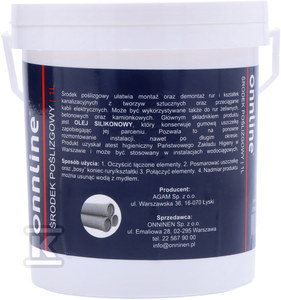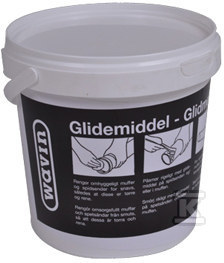Anyone who has ever connected PVC pipes in a sewage system without lubricating the gaskets knows what resistance means. Moreover, even if the end of the pipe can be inserted into the socket relatively easily, one must take into account the risk that one day it will be necessary to disassemble the connected elements, which may be extremely difficult without a lubricant. A special silicone-based lubricant is used to lubricate PVC pipes, but some people use e.g. dishwashing liquid. Find out why you should use silicone grease and how to properly use pipe lubricant.

Check pipe lubricants at the Onninen wholesaler
Why is it worth using silicone grease when connecting pipes?
As we have already mentioned, pipes are joined using various products. Slip pastes are commonly used. These are substances belonging to construction chemicals. They provide high slip, necessary when connecting pipes and fittings. The specialized paste significantly facilitates the installation of sewage socket pipes. Prevents cracking of the PVC pipe socket and fitting. It increases the precision of the connections created and supports their durability and tightness. Moreover, it facilitates the disassembly of pipes, fittings or sleeves and facilitates cable pulling. Additionally, the paste protects the seal against rotting, extending its service life. Even if a lot of time has passed since the installation, it can be safely dismantled. The entire system becomes less susceptible to failure.
Pipe lubricant is generally made on the basis of silicone (silicone oils). The key advantages of silicone lubricants include:
- excellent slip and high viscosity,
- impregnation of lubricated surfaces,
- resistance to extremely low and high temperatures,
- protection of seals against destruction,
- no risk of deformation and cutting of the seal,
- ability to displace water,
- protection of elements against corrosion and dirt,
- high resistance to solvents and many chemicals,
- safety for the skin.
Silicone agents are also available in the form of an aerosol. Many professionals use silicone sprays because of the convenience of use and cleanliness of work.
We often hear the opinion that a specialized lubricant can be successfully replaced with ordinary dishwashing liquid or even... cooking oil or margarine. For the safety of the water installation and its users, we recommend using only professional construction chemicals, factory-adapted to lubricate pipes. This is a small investment that can save us a lot of trouble. Prices of silicone grease in tubes start from just a few zlotys. Please remember that various "replacement" lubricants dry quickly, causing the elements to seize. They can also damage rubber seals.
It is worth mentioning that the creamy silicone lubricant paste works best when the pipe is made of plastic, so it is smooth and flexible. In the case of concrete, reinforced concrete or stoneware pipes, silicone grease may not provide maximum effectiveness or efficiency. Although there are universal pastes available on the market for use on any pipe, it is better to use dedicated lubricants to connect highly porous elements.
How to properly apply lubricant to the pipe?
 The method of using the lubricant is very simple and described in detail by the manufacturer in the attached instructions or directly on the packaging. The connected elements should be in one line. After cleaning the spigot end of the pipe and the seal in the socket, lubricate the elements with a lubricant and connect them by completely pressing the end of the pipe into the socket.
The method of using the lubricant is very simple and described in detail by the manufacturer in the attached instructions or directly on the packaging. The connected elements should be in one line. After cleaning the spigot end of the pipe and the seal in the socket, lubricate the elements with a lubricant and connect them by completely pressing the end of the pipe into the socket.
Then we gently withdraw the pipe (by approx. 10 mm), thus creating an expansion gap, i.e. space for the pipe to extend due to thermal expansion. This operation is omitted in the case of socket-less pipes, which are connected using extension-compensating socket joints. There is a plastic ring stop in the middle of the sleeve.
Before applying grease, pipes and fittings must be completely dry and their condition checked. The elements should be perfectly smooth and scratch-free. Scratches, especially deep ones, may reduce the tightness of the connection. The final stage of assembly work is always a tightness check.
It is important not to overdo the amount of lubricant dosed! Excessive use of grease may result in the preparation entering between the seal and the socket groove and causing the seal to slip out and fold up.
Resistance of pipe lubricants to weather conditions
 Pipe lubricants based on silicone oils are resistant to the destructive effects of atmospheric factors such as water, moisture, high and low temperatures, and often also to solvents and chemicals. They are suitable for use in difficult environmental conditions. Detailed information about the properties of a given product can be found on the packaging or in the description on the website.
Pipe lubricants based on silicone oils are resistant to the destructive effects of atmospheric factors such as water, moisture, high and low temperatures, and often also to solvents and chemicals. They are suitable for use in difficult environmental conditions. Detailed information about the properties of a given product can be found on the packaging or in the description on the website.
Pipe lubricants at the Onninen wholesaler
The Onninen plumbing wholesaler offers a wide range of modern pipe lubricants for professionals and amateurs. Their compositions are based on silicone oils. Our product range includes both lubricants and aerosols.
Too much choice? Contact us! We will help you find the right pipe lubricant and advise you how to use it.
